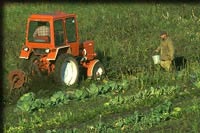 In the next hour, there will be 9,000 babies born on our planet. By this time tomorrow, the world will have an additional 200,000 mouths to feed. At the moment, the world produces enough food for its people, but food does not always reach those most in need, leaving some 800 million people hungry. These people benefit most if they are helped to grow their own food and to do it efficiently.
In the next hour, there will be 9,000 babies born on our planet. By this time tomorrow, the world will have an additional 200,000 mouths to feed. At the moment, the world produces enough food for its people, but food does not always reach those most in need, leaving some 800 million people hungry. These people benefit most if they are helped to grow their own food and to do it efficiently.
The World Bank in partnership with other institutions and organizations is working to find more creative ways for producing food in a sustainable way. We are also sharing knowledge and technologies around the world so that we can learn from each other and help develop more efficient, equitable, and Earth-friendly practices.
 Hunger. It's not What You Think
Hunger. It's not What You Think
If you're reading this, chances are you have enough to eat every day. But people living in many parts of this world of plenty face the ultimate daytime nightmare: hunger. Find out what hunger really is what causes it, and what can be done to fight it.
 Consultative Group on International Agricultural Research (CGIAR)
Consultative Group on International Agricultural Research (CGIAR)
This web site is created mainly for researchers and scientists, but you can use and enjoy it too. Here you will find fact sheets and a photo gallery of crops and farming around the world. Also, view the public service announcement "Hunger is Everyone's Concern". And check out the link to Future Harvest to find out how scientists are working with farmers to find sustainable ways to preserve and enhance the world's resources.
 Hunger in a World of Plenty
Hunger in a World of Plenty
Explore these pages for insight into the issues of
nutrition and
food security.
 World Bank Electronic Media Products and Services
World Bank Electronic Media Products and Services
Access these pages for short RealVideo and QuickTime public service announcements.
 Explore these tables from World Development Indicators, 1999 to find data on agriculture for over 140 of the world's countries:
Explore these tables from World Development Indicators, 1999 to find data on agriculture for over 140 of the world's countries:
 Environmental Data Sheets: Europe and Central Asia
Environmental Data Sheets: Europe and Central Asia
Check out the data and key information on agriculture and use of natural resources in Europe and Central Asia. Access country-specific information by selecting a country from the map.
 Map: Irrigated Land
Map: Irrigated Land
Explore this and other interactive maps to learn about world's irrigated land areas, freshwater resources, nationally protected areas, and more. To view these maps, select the indicator you are interested in from the list at the left of the screen, and then click on "Refresh Map". To use zoom in/out and other options at the top of the screen, select the feature you want to use and click anywhere on the map.
| Around the World |
 |
 East Asia and Pacific
East Asia and Pacific
 Europe and Central Asia
Europe and Central Asia
 Middle East and North Africa
Middle East and North Africa
 Latin America and the Caribbean
Latin America and the Caribbean
 South Asia
South Asia
 Sub-Saharan Africa
Sub-Saharan Africa
 Various Countries
Various Countries
-
Agricultural Extension
Read these case studies to learn how Agricultural Extension works in different countries of the world to help rural people better their own lives through transferring technology for sustainable agricultural production, through marketing; mobilizing and organizing farming, rural groups and communities; and through educating farmers.
| Digging Deeper |
 |
 Tackling the Issues
Tackling the Issues
The issue of food and agriculture is closely related to
Natural Resources,
Sustainable Development,
Energy,
Climate Change,
Pollution,
Water and Sanitation,
and the others. Explore these web pages to learn more about the interactions that interest you.
 Agriculture and Environment
Agriculture and Environment
This web page links to articles on issues related to agriculture and environment. Explore the page and read the articles of interest to you.
 Hunger Issues
Hunger Issues
Explore these scientific papers presented at the National Academy of Sciences colloquium "Plants and Population: Is There Time?" for even deeper insight into the issues of hunger.
 UN Food and Agriculture Organization
UN Food and Agriculture Organization
Explore this web site to learn what the United Nations Organization is doing to raise levels of nutrition and standards of living, to improve agricultural productivity, and to better the conditions for rural people.
 World Bank Agriculture Page
World Bank Agriculture Page
Explore this web page if you would like to get more technical and detailed information on the Bank's work in the field of agriculture and food. Keep in mind that the most of the information here is written for agriculture specialists and some of it might be overly technical for your purposes.

